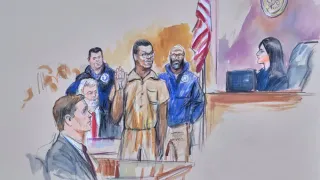June 18, 2025
Review: 'Sally' a Salute to America's First Woman in Space
Kilian Melloy READ TIME: 4 MIN.
Friends, colleagues, and her 27-year same-sex life partner unveil the unseen side of American hero – and first woman from the U.S. to venture to space – Sally Ride in Cristina Costantini's moving documentary, "Sally."
The director assembles archival video that reminds us of Ride's public-facing persona: guarded, cool, confident, and dressed in feminine style. She presented herself in a heteronormative fashion, and even married a fellow astronaut, Steve Hawley – something that we hear was a "great PR move," given that Sally was part of an inaugural cohort of potential astronauts that, for the first time, included women and racial minorities.
Sally Ride flew on board Challenger several years before that ill-fated shuttle exploded, killing seven of Ride's colleagues, including fellow female astronauts Judith Resnick and schoolteacher Christa McAuliffe. To earn her seat on the shuttle, Sally had to master all the same skills and materials as her male colleagues, as well as tolerate the sexist views they brought with them to the astronaut program. (One of her male colleagues, speaking to Costantini's camera, describes his younger self as a sexist pig and testifies as to how working with female astronauts opened his eyes to his own prejudiced thinking.) But there was still another burden that Ride carried: the secret of who she really was.
Ride is described as having been a private and non-demonstrative person. Some of that seems to have been a matter of temperament related to her family background; her mother, Joy Ride, answers one of Costantini's questions with, "If I knew how I felt about feelings, I would probably not tell you." But how much was a matter of keeping up appearances?"
Tennis legend Billie Jean King knew Sally because as a younger person, the astronaut attended a tennis camp King had established and the two became friends. When King found herself caught up in the "scandal" of a lesbian palimony suit, with her endorsement deals instantly drying up, the lesson for Sally and for all queer people – or so we hear from on-camera commentators – was to stay in the closet.
Sally had to thread a very fine needle of professionalism and projection, proving herself competent in ways her male colleagues were not required to while also appearing to be a heterosexual woman who would not frighten the straight world.
It's hard to tell how much of Sally's personal style with the press came from a need to stay closeted, but clearly there were aspects to the role she was expected to play as a woman that she found tiresome. Quizzed, together with her husband, about whether they wanted children, Sally shuts that line of inquiry down, telling the interviewer that it's none of her business. At a different moment in the archival footage she lets journalists know that they may address her as either "Sally" or "Dr. Ride," but not "Ms." After she made history by being selected for a shuttle crew, she had to tolerate endless asinine questions from the press, and she's plainly exasperated about it.
Then there's her relationship with Tam O'Shaughnessy, the childhood friend who, eventually, became her life partner. Sally was still married when, in 1985, their relationship became something new – and intimate. Sally divorced Hawley, and, to hear him tell it, it was more of a relief than a surprise; they were good friends, but hardly a love match. The doc doesn't delve too deeply into Hawley's perspective otherwise, and it's not entirely clear why he married Sally in the first place.
O'Shaughnessy talks about the challenges of trying to maintain a relationship with Sally, who, even at home, could be unforthcoming. Over time, they began working those relationship kinks out – eventually, they registered as domestics partners, and, when Sally was diagnosed with pancreatic cancer, the astronaut openly referred to Shaughnessy as her partner to medical staff.
Still, the world at large didn't know that Sally was a lesbian, or that she and O'Shaughnessy were together until O'Shaughnessy revealed it in the obit she wrote for Sally. Some of that ongoing reluctance to be out seems to come down to a desire to protect the business the two women founded to promote STEM to young female students.
The poignancy of Costantini's film lies not just with the way Sally Ride moved through the world – a phenomenally gifted person, she overcame barriers that would have stopped others – but also with the contrast between the world as it is now and as it was when America's space program was a going concern, women and other minorities were making meaningful strides toward full participation in every area of human endeavor, and the government, while never perfect, at least seemed to be working for the larger good in a general sense. It's an accident of timing, but "Sally" is a document not just of a significant historical figure, but to an era in history that helped make her accomplishments possible.
"Sally" is streaming on Disney+ and Hulu.






